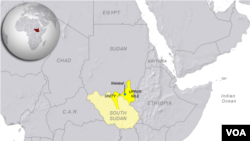Fighting flared this week in South Sudan's northeastern Upper Nile state despite government forces' capture of a key rebel headquarters.
The clashes indicated there was no end in sight to the four-year civil conflict.
The most recent violence took place over control of the town of Pagak on the Ethiopian border, which had served as the rebels' main base since early 2014.
Government forces captured Pagak last week after launching an offensive in early July, but rebel spokesman Lam Paul Gabriel said his side took the town back Friday morning after attacking government troops.
"At about 7, we launched an attack on government in Pagak. We dislodged them from Pagak, so we are in full control of Pagak from 10 a.m.," he told VOA.
The government's original capture of Pagak was a devastating blow for the rebels, who had controlled the border town since South Sudan's civil war started in December 2013.
The loss of Pagak was the latest in a series of defeats for the rebels in the northeast over the past year, yet the fact that they were able to fight back showed the conflict was far from over. Though the government holds major towns in the northeast, the insurgents maintain control of much of the rural areas.
'We are strong'
"This is a clear sign that if we are pushed to a corner, we will also push back," Gabriel said. "They took Pagak from us, and now we took it back. We are saying the same with any other places now. We are strong."
A spokesman for government forces, Dickson Gatluak, confirmed there was fighting in Pagak, but he denied that the rebels took control of the town.
"In the morning our defensive lines came under heavy fire from the anti-peace elements. We actually engaged them, and after a fierce battle our forces managed to strike back in self-defense and we repulsed them," he said.
The government's offensive on Pagak drew criticism from Western nations for breaking a cease-fire declared in May by President Salva Kiir, whose forces are fighting rebels led by former Vice President Riek Machar.
Dozens of foreign aid workers evacuated the Pagak area as government troops closed in.
But Gatluak said the offensive was necessary to bring government services to the people, including health care and education, which had been largely cut off from rebel areas.
He said civilians had welcomed the arrival of government troops, and that some civilians had returned to the town following the government takeover.
"The civilians in Pagak have been held hostage for almost four years since the conflict erupted," Gatluak said. "It was their call for the government to be on the ground to provide the services."
'The sound was terrible'
But South Sudanese aid worker Sarah Nyanath, who was living in Pagak, said she was among tens of thousands of civilians who fled from the government offensive into Ethiopia, rather than welcome the soldiers.
"The government is lying that it is being received [by the people]," she said. "They are not liberating the area. They are terrorizing the area."
Nyanath, speaking from Ethiopia where she is now a refugee, said two children drowned while fleeing across a river to Ethiopia to escape the fighting.
She said "the sound was terrible" as the army shelled the area. "They were doing it in the night. You can see actually when these rockets are opening up. You can see the lights when these things are bursting out. When it hit the ground, it actually shook the ground — you can see the ground vibrating. It is so, so, so scary."
As South Sudan's war churns on, it is likely that even more civilians like Nyanath will be forced to run.





